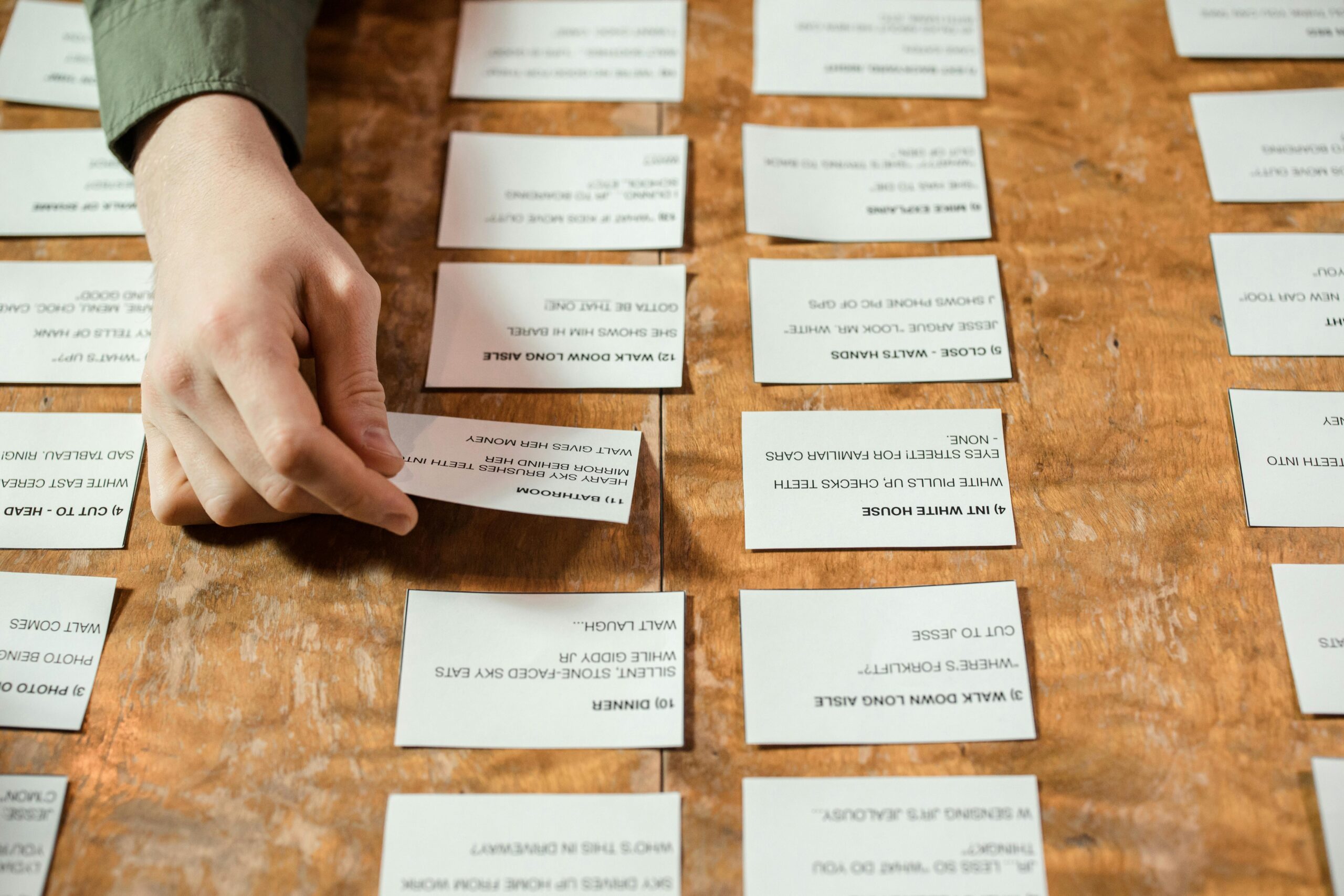How to memorize lines
So, you’ve got a show coming up and your anxiety is spiking because you are worried you might forget your lines. Is this a common source of stress for you as an actor/performer? Do you have any tried and true methods you use to help you with line memorization? I’ll share my favorite methods below – maybe one of them will be useful to you.

Index cards
My very favorite method (which is why it’s first place) is utilizing index cards. They can take a little time to prep, yes, but I find the work is well worth it. To prep your index cards, you’ll need to write your cue line on the front of the card (sometimes it helps if it’s in its own color), and your response to that cue on the back of the card, in another color. If the cue line (or the line that another actor/person says that is your prompt to say your line) is rather long, you can shorten it to just the relevant last sentence or two that you know you can listen for, this will be your prompt. Sometimes, I will underline specific words in the cue line so that when I hear them said aloud all together, it will trigger the response line (on the back of the card) because I had that visual cue of the underlined words. I read somewhere that the color red is helpful for memorization – try to write your response lines in red and your cue line in any other color, and see if that helps! Need some index cards? Try this pack on Amazon for $18 that comes with a ring already inserted for ease of flipping (this is an Affiliate link).

Highlighting lines in your script
This technique is my second favorite. This is a good alternative technique if you really don’t like writing your lines down or if you simply don’t have the time to spend writing your cue lines on index cards. Go through your entire script and in one color, highlight (or underline) your cue line, and in another color, highlight your response to that cue. Take a piece of paper (dense enough so you cannot see through it), and from the top of the page, slowly drag it down the text until you see your cue line, and lower it to your response. Read that aloud, then push the paper back up over your response, and re-read your cue line and see if you can say your response aloud. Do this several times. If you don’t have the full response memorized right off the bat, that’s okay – this process requires repetition over a span of time – so it’s best if you try this at least once a day until you feel you’ve mastered your lines. Running low on highlighters? Grab this set from Sharpie for just under $7 (this is an Affiliate link).

Record your cue line and response.
Another way you can work on line memorization is by recording your lines and playing them back to yourself. If it helps, ask a friend to record your cue line in their voice, and leave a blank space for you to be able to dictate your lines aloud for as long as the line will take. Alternatively, you can record both your cue line as well as your response and listen to the recording during the day, so you would not have to sit and focus on text in front of you. Listen to this recording while folding laundry, weeding out in the yard, or doing the dishes – the more you hear the lines being spoken aloud, the more likely you will be able to repeat them back. Think about all the movie quotes you or your friends have memorized over the years. Having watched your favorite movies on repeat allows you to be able to recite the lines back without a problem.

Ask a friend or family member for help
Finally, if you prefer working with others instead of working independently, you may choose to find a friend or family member to help read your cue lines aloud for you. If you can’t give your response yet off the top of your head, ask them to start reading your line for you and stop them if you think you can finish it. Have them go back, re-read your cue line, and try to recite your response all by yourself the second time around. Do this as many times as you choose. Again, you do not have to memorize everything in one go – this should be a longer process where you are using these methods once or twice a day (maybe with breakfast and then again after dinner) to keep your lines fresh. Do not save your line work until the week of the performance – that will only cause you undue amounts of stress!
Have any of these methods helped you in the past? Do you know of a line memorization method that I haven’t listed above? Share yours in the comments!







One technique I’ve used:
-Go page by page in your script (or you can divide by logical segments) following this routine: first, read your lines directly from the script. Then read through again, this time only referencing the script when you get stuck. Finally, read through again, this time without looking at the script at all. This works well with groups, but you can also do it solo, just use a card to prevent yourself from seeing your lines ahead of time.
I generally try to do this technique by saying my lines out loud. This helps not just with learning the lines, but with developing character and timing with it. It can be a good time to play with your inflections, but that might affect your focus on your lines. Also, practicing lines out loud can limit when and where you can do it. It might be awkward delivering monologues around your coworkers, if that’s when you have time to practice. I’ve found writing lines down to be very effective. It forces your brain to really linger on each word and anchors the lines in a physical act.
I’ve talked to a lot of people who don’t think they could ever perform simply because they ‘wouldn’t be able to learn all those lines’. Memorization can be hard for some, but with effort and the right strategies, it’s very achievable.